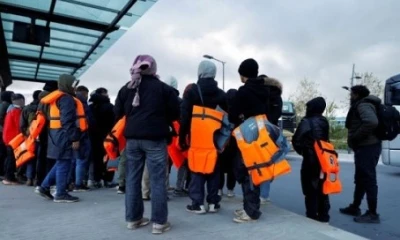British authorities have launched the detention of asylum seekers as part of a new initiative aimed at deporting them to Rwanda, with initial deportation flights scheduled to depart as early as July, according to media report.
Home Secretary James Cleverly commented, “Our dedicated enforcement teams are working swiftly to detain those who have no right to be here so we can proceed with deportation flights.”
This confirmation of detainment procedures follows recent legislation designating Rwanda as a safe third country, effectively bypassing a previous UK Supreme Court ruling that deemed the scheme unlawful on human rights grounds.
Prime Minister Rishi Sunak, reiterating his commitment to curbing migrant arrivals via small boats from mainland Europe, emphasised that detentions would occur promptly ahead of deportation flights scheduled to commence within “10 to 12 weeks”.
Describing it as “another major milestone” in the Rwanda deportation plan, the UK’s Home Office released visual documentation showing immigration enforcement officers detaining individuals with handcuffs at various locations.
In response to these developments, the charity Freedom from Torture condemned the government’s actions, stating, “This government has lost its last ounce of humanity.”
A senior minister disclosed that the government aims to deport 5,700 individuals this year, following Rwanda’s “in principle” agreement to accept that number. However, authorities have lost contact with thousands of potential deportees, with only 2,143 currently located for detention, leaving over 3,500 unaccounted for.
Ministerial assurances have been provided that enforcement teams will locate these individuals, with commercial charter planes already reserved and an airport placed on standby.
Against the backdrop of more than 7,500 arrivals via small boats from France this year, the government argues that the policy will act as a deterrent against perilous English Channel crossings.
In light of the Supreme Court ruling issued last November, human rights organisations and unions opposed to the policy are poised to mount fresh legal challenges to halt the deportation flights.
Natasha Tsangarides, associate director of advocacy at Freedom from Torture, highlighted the pervasive fear among asylum seekers, warning that the prospect of detention and deportation to Rwanda would compel some to go underground and sever ties with their support networks.
While Rwanda is praised for its stability and modern infrastructure, rights groups accuse President Paul Kagame of governing in an atmosphere of repression, marked by restrictions on dissent and free speech.

















